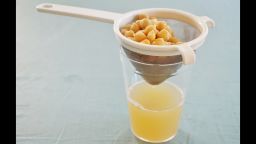Story highlights
Fluid from chickpeas can be a vegan alternative to dairy and eggs in recipes
No nutrition information is available, but it's gluten-free and low in calories
The next time you open a can of chickpeas, don’t pour the liquid down the drain—stash it in your fridge. That fluid, known as aquafaba, has become quite a sensation online. That’s because it can be used as a vegan alternative to dairy and eggs in everything from meringue to mayonnaise. If you’re curious about this new trend but want some more info before trying it, here are five things you should know about aquafaba.
There are two ways to get it
Aquafaba can be the water you used to boil bagged pulses (lentils, beans, and peas, like chickpeas), or it can be the liquid from canned versions of these foods. It seems to work best when it’s derived from beans or chickpeas. With a little whipping, the liquid develops a fluffy texture that resembles whipped egg whites, whipped cream, or milk foam.

RELATED: Switching to a Vegan Diet? 12 Things You Need to Know
It’s a brand new trend
Unlike quinoa or kale, aquafaba isn’t a food that’s been around for decades and suddenly became hot. According to Aquafaba.com, the story starts with a French cook named Joël Roessel, who began experimenting with the liquid from canned goods in search of an egg alternative in 2014, and wrote about his results on his blog. In February of 2015, two French scientists posted a video on YouTube in which they whip the liquid from canned chickpeas into a foam, and made chocolate mouse.
An American engineer named Goose Wohlt was inspired by their video and discovered the liquid could be used in place of eggs to create a vegan meringue, reports The New York Times. Wohlt posted his findings in a Facebook group and with the help of an excited vegan community, coined the liquid aquafaba, a combination of the Latin words for “water” and “beans.” The trend took off from there—big time.
Nutrition info is limited
Because aquafaba is so new, its nutrition analysis isn’t readily available. I can only find one source to date: Aquafaba.com, which raised funds to have the liquid tested by a lab. The analysis found that a chickpea-derived aquafaba contains about 3 to 5 calories per tablespoon, but is not a significant source of carbs, protein, fat, vitamins, or minerals. Further research may reveal antioxidants, B vitamins, or other beneficial compounds that weren’t included in the initial analysis. But for now, the biggest benefits of aquafaba are that it’s plant-based, naturally gluten-free, low in calories, and can mimic the consistency of ingredients like eggs and dairy for those who choose or need to avoid them.
RELATED: Delicious Vegan Recipes
You’ll probably need a sturdy mixer
Most of the videos and recipes online use a KitchenAid mixer with a balloon whisk. A hand mixer is another option, although it will generally take longer, and you likely won’t achieve the same consistency as a stand mixer. While blenders typically won’t work because the speed of the blades destroys the foam, some online posts claim to have made aquafaba by vigorously shaking the liquid in a sealed jar.
RELATED: What the Heck is Nooch and Why Is Everyone Talking About It?
Simple ways to use it
Earlier this year I had the pleasure of watching a chef from the Culinary Institute of America at Greystone create a simple yet delicious chocolate mousse, starring aquafaba and melted dark chocolate. Another easy option is “ice cream” typically made with aquafaba, frozen fruit, and honey. But you’ll find dozens upon dozens of recipes online. I recommend using these three rules of thumb: 1) Look for pulses that don’t contain added salt, especially if you’re using a larger amount of liquid. 2) Keep added sugar to a minimum, and use natural or less processed options. 3) Choose recipes packed with superfood ingredients, including fruit, fresh herbs and spices, dark chocolate, nuts, and seeds.
Follow CNN Health on Facebook and Twitter
RELATED: 3 Hearty Vegan Recipes Even Meat Eaters Will Love
The process of making aquafaba is pretty cool, so if you haven’t tried it yet, give it a go, have fun, and keep it healthy. (And if you’re looking for nutritious recipes to use up the chickpeas and beans, check out my recipes featuring pulses.)
Cynthia Sass is a nutritionist and registered dietitian with master’s degrees in both nutrition science and public health.










